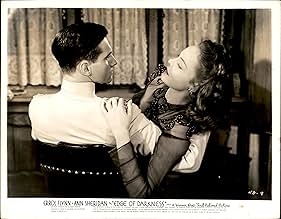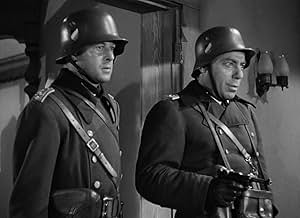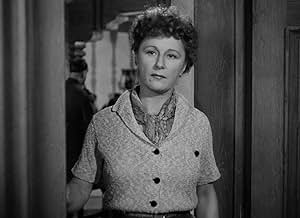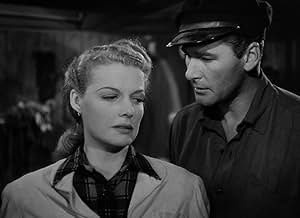Dopo due anni di occupazione tedesca, un piccolo villaggio di pescatori norvegese insorge e si ribella contro i nazistii.Dopo due anni di occupazione tedesca, un piccolo villaggio di pescatori norvegese insorge e si ribella contro i nazistii.Dopo due anni di occupazione tedesca, un piccolo villaggio di pescatori norvegese insorge e si ribella contro i nazistii.
- German Lieutenant
- (non citato nei titoli originali)
- Townsman
- (non citato nei titoli originali)
- Petersen
- (non citato nei titoli originali)
- Maj. Ruck
- (non citato nei titoli originali)
Recensioni in evidenza
The cast is excellent. In addition to the three big stars I list above, who all do commendable work, there's an outstanding supporting cast. Judith Anderson is a ballsy resistance fighter who is in love with one of the Nazis but doesn't let that sway her loyalty. Ruth Gordon gives one of her patented sensitive and soft-spoken performances. Charles Dingle and John Beal play the rat bastards who sell their own out to the enemy. One of them has a moment of redemption by the end. Morris Carnovsky is extraordinary as an elderly man who stands up to the Nazis despite the danger. Roman Bohnen is a scene stealer as a patriot who has to overcome his fear. Helmut Dantine plays the scar-faced Nazi in charge of the occupation. Many other fine actors in small parts, some of whom may only get one scene to make an impact but they make the most of it.
Powerful script, beautiful cinematography, and excellent direction. The climactic battle scene is intense. It's an unflinching war movie with little to no comic relief, a rarity for Warner Bros, who usually threw Alan Hale or somebody into these pictures to add some lighter moments. But this is a serious movie about bravery and the sacrifices that so many made in the war. The story doesn't call for lightheartedness. It's one of the best war movies Flynn or WB made.
Errol Flynn is cast in the lead as a Norwegian patriot who is slowly and very covertly trying to plan for a rebellion against their Nazi overlords. Interestingly, while Flynn and the rest do not sport Norwegian accents, the film (and in particular, Flynn's performance) is generally understated. This helped make the film seem more realistic and heightened the emotional impact.
In addition to Flynn, the film also stars Ann Sheridan, Walter Huston and Ruth Gordon. However, unlike most Warner Brothers films of the day, the usual cast of supporting actors (Allen Jenkins, Frank McHugh, Alan Hale and the rest) are absent. This was a good decision, as the usual "comic relief" style of support is --replaced with a gritty yet believable group of actors.
What I also liked about the film was that while the Nazis were very brutal and evil, they were not quite so over-the-top as they were in many propaganda films of the day. Yes, they murdered and even raped, but the whole thing was handled more realistically than many films--the Germans were not parodied or ridiculous--making them all the more scary.
The film ends with a terrific final confrontation scene between the Norwegians and the Nazis. It was very deftly filmed and was super-exciting.
All in all, this is one terrific film--mostly due to realism and excellent performances all around--from direction to sets to writing to acting to cinematography. A real stand out among the crowded pack of American WWII films.
There was a popular sub-genre of war picture during the war years that centered on common European folk rising up against Nazi occupiers. This is one of the best that I've seen, although the propaganda nature of the storytelling keeps it from being truly great. Another minor weakness lies in Flynn's character, a rather bland cipher with little to distinguish him. Flynn apparently felt the same himself and tried to get out of the movie, but in the end it turned out to be a quality picture on his resume. Sheridan is good, if a bit too made up for a Norwegian villager in her situation. I also liked Nancy Coleman as a Polish gal at the end of her rope, and Judith Anderson as a rather severe woman whose secretly in love with one of the occupying soldiers. The movie's explosive climax seems light years away from director Milestone's work 13 years previously on what is arguably the greatest anti-war film, All Quiet On the Western Front.
Lo sapevi?
- QuizAccording to the book "The Films of World War II" by Joe Morella, Edward Z. Epstein and John Griggs, the production was beset by many problems. The book states, "Ann Sheridan parted from husband George Brent; Errol Flynn was indicted for rape; location shooting in a small California town was delayed several weeks because of fog, during which Ruth Gordon and Judith Anderson were besieged with telegrams from Katharine Cornell demanding their return to New York for her stage production of 'The Three Sisters'. Miss Gordon was restrained from leaving, but not before letting it be known that she hated Hollywood and the picture. Fortunately for Warners, the fog lifted, Flynn was acquitted, and the film was completed."
- BlooperAfter Gunnar (Errol Flynn) says to Karen (Ann Sheridan), "When my father was my age, he already had two children", there's an obvious jump cut indicating some dialogue had been deleted; this likely was due to a failure to gain acceptance by the Production Code censors.
- Citazioni
Captain Hauptmann Koenig: What do you want?
Sixtus Andresen: I... thought it only right, considering that you are... de facto commandant of the village, to acquaint you with a decision that I've made.
Captain Hauptmann Koenig: I'm very busy.
Sixtus Andresen: I know. I hope you'll forgive me. I know I'm being selfish. But, uhh... Why did you want my house?
Captain Hauptmann Koenig: For a block house! But what was it you wanted to see me about?
Sixtus Andresen: I cannot let you have my house.
Captain Hauptmann Koenig: You what?
Sixtus Andresen: I must forbid you to enter my house.
Captain Hauptmann Koenig: [laughs hysterically] Are you insane? I could have you shot!
Sixtus Andresen: I know. But if you're interested, I'll tell you what brought me to my conclusion, which is, I can assure you, completely unshakeable. You see, I am well past seventy, and at my age it would be foolish for me to be like Socrates' enemies, and fear death more than I love truth.
Captain Hauptmann Koenig: Go on!
Sixtus Andresen: ...I have no guns, no airplanes, no force. I disdain.
Captain Hauptmann Koenig: SILENCE!
Sixtus Andresen: What you don't understand is that the individual man...
Captain Hauptmann Koenig: QUIET, YOU FOOL!
Sixtus Andresen: - The individual man must stand against you like a rock.
Captain Hauptmann Koenig: [shaking Andresen] Will you STOP!
Sixtus Andresen: [calmly] No. If I were afraid, there might be hope for you, but I am not.
[Koenig slaps Andresen across the face]
Sixtus Andresen: There are certain things you cannot take away from me... What is mine, is mine. Do you think you can stop the working of my brain and my heart?
[slap]
Sixtus Andresen: We are not animals; we are men.
[slap]
Sixtus Andresen: That is the foundation of law - you cannot win.
[slap]
Sixtus Andresen: Where are your courts?
[slap]
Sixtus Andresen: Your judges?
[slap]
Sixtus Andresen: And your juries?
[slap]
Sixtus Andresen: Until you bring them forward, I must forbid you my house.
Captain Hauptmann Koenig: HE 'FORBIDS'!
[knocks the old man down the stairwell]
- ConnessioniEdited into Il capitano di lungo... sorso (1969)
- Colonne sonoreA Mighty Fortress is Our God (Ein' Feste Burg)
(uncredited)
Traditional German hymn
Lyrics by Martin Luther (1535)
English translation by Frederick H. Hedge (1853)
Played and sung offscreen by an unidentified chorus during the opening credits, in the church,
and at the end
Variations in the score throughout
I più visti
- How long is Edge of Darkness?Powered by Alexa
Dettagli
Botteghino
- Budget
- 1.653.000 USD (previsto)
- Tempo di esecuzione
- 1h 59min(119 min)
- Colore
- Proporzioni
- 1.37 : 1





































